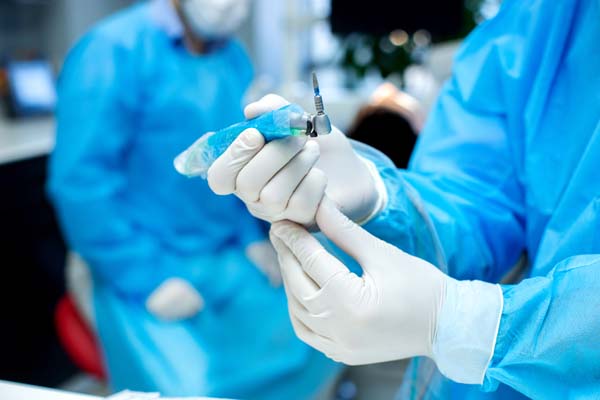Implant Dentistry: The Single Tooth Replacement Process

Implant dentistry procedures have the highest rate of success among all the options available for replacing missing teeth. The process of replacing a single missing tooth is straightforward and involves using an implant as artificial tooth roots and supporting it with a dental crown. Continue reading to learn how the process works.
Implant dentistry and tooth replacement
Regardless of the number of teeth to be replaced, the dental implant procedure typically involves three main stages.
1. Preparation
Once the dentist has determined that using dental implants is the right option, they will take digital x-rays and sometimes CT scans to get a complete overview of the patient’s bone structure, density, and supporting tooth structures. If the damaged tooth is still present on the jaw, it will need to be removed before the implants are placed.
2. Placing the implant
The process of placing a single tooth implant takes between 30 minutes to an hour. Patients will be given a local anesthetic to minimize discomfort during the procedure. The dentist will make an incision in the gums to create an access hole for the implant post, which will be inserted into the jawbone. Over the following months, the bone will grow around the implant naturally to hold it in place.
When osseointegration is complete, another procedure will be required to place the abutment, which is the piece that connects the crown to the dental implant. The process is minor and usually done on an outpatient basis. It can be done immediately after placing the implants or weeks later.
3. Placing the crown
The final stage of the implant procedure is to attach the artificial tooth restoration. The dentist will take impressions of the patient’s teeth to fabricate a custom dental crown that blends with the rest of the teeth. Depending on the situation, a temporary or permanent dental crown may be attached, either immediately after inserting the implant or some weeks later.
Modern technology and techniques in implant dentistry allow patients who are getting a single tooth replacement to get an implant and temporary crown in one appointment. This case allows for a seamless treatment, allowing patients to leave the office with a complete smile.
After some weeks, when the jaw has healed sufficiently, and the permanent crown is ready, patients can return for another appointment. The permanent crown can be screw or cement-retained, although the former is usually preferred for hygienic reasons.
Once the permanent crown is in place, patients can perform dental functions as usual. The implant and replacement tooth will function like natural teeth. The only clause is to keep up with oral health routines to keep the mouth healthy.
The benefits of single-tooth implant replacement include:
- No harm to existing teeth, unlike with a dental bridge
- Preservation of jawbone structure
- Better stability and strength
- Dental implants are indistinguishable from natural teeth
Ready to replace your missing tooth?
Every smile is unique, as is every treatment recommendation. The dentist will consider factors such as oral and overall health, bone density, and position of the lost tooth before recommending implant dentistry. Schedule a consultation today to learn more.
Request an appointment here: https://www.queensfamilydental.com or call Queens Family Dental at (718) 954-9425 for an appointment in our Flushing office.
Check out what others are saying about our dental services on Yelp: Implant Dentist in Flushing, NY.
Recent Posts
A family dentist offers comprehensive care to individuals of all ages, making them an ideal option for older adults looking to maintain good oral health. As people age, their dental needs evolve, and regular visits to a family dentist can help address specific issues that arise in later years. Older adults often face unique dental…
When it comes to general dentistry, there are a lot of different materials used. Metal, in particular, has been used for a long time, which makes it a reliable material when it comes to certain procedures. Of course, there are many other materials that can be used and that are frequently selected, but metal is…
Partial dentures are a great way to improve your smile, oral health, and ability to function by replacing missing teeth. It is helpful to have a full understanding of what partial dentures are and why they are often the more preferable treatment solution for patients to decide if treatment is right for you.This review defines…
Taking children to a kid friendly dentist is a great idea, especially if there is a noticeable dental issue, such as white spots. White spots should never be ignored, regardless of the patient's age. However, children need to visit a kid friendly dentist because their teeth are still developing. Learn more about taking a child…



